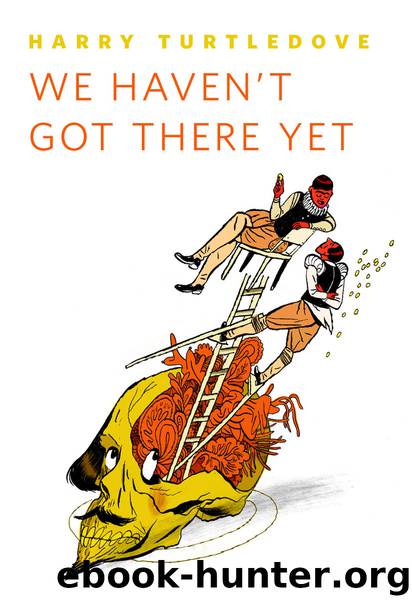We Haven't Got There Yet by Harry Turtledove

Author:Harry Turtledove
Language: eng
Format: epub
Publisher: Tom Doherty Associates
Published: 1967-03-08T05:00:00+00:00
Shakespeare waits to see how Stoppard chooses to end what he has begun. As he waits, as he watches, he sees things that escaped him earlier. Rosencrantz and Guildenstern are not quite the pair of identical zeds—unnecessary letters—he first took them to be. Rosencrantz has no real notion anything is wrong. Guildenstern sometimes does, but he cannot see what his troubles are or do anything about them. Which is the worse, the baser, futility? One more thing to ponder.
And, whenever the action calls for them, both Danes fall back into Hamlet’s story, in which they are trapped like flies in sticky pine sap. Their diction and manner change. They have sudden purpose—Shakespeare’s purpose. But, although they are Hamlet’s schoolmates and thus longtime acquaintances, he is no more sure which is which than was his uncle before him.
The tragedians and their spokesman also flutter on the fringes of the plot. They have more self-knowledge than Guildenstern or Rosencrantz: they know what they do. They know it from the inside out, too. Some of the words the playwright puts in the spokesman’s mouth…
“You don’t understand the humiliation of it—to be tricked out of the single assumption which makes our existence viable—that somebody is watching….” he howls. After a confused response (what else?) from Rosencrantz, he adds, “Don’t you see?! We’re actors—we’re the opposite of people!”
Shakespeare starts laughing and finds he can’t stop. The woman crunching nutmeats edges away from him. So do the pockmarked man and his ladylove Lucy. They don’t think it’s funny. They think he’s funny, and in no good fashion. He feels sorry for them. They must never have performed.
As Rosencrantz and Guildenstern likewise recoil, the spokesman dons calm like a mantle. And, as with a mantle, who knows what that calm conceals? “Think, in your head, now, think of the most…private…secret…intimate thing you have ever done secure in the knowledge of its privacy….”
He waits. Rosencrantz looks guilty. Shakespeare no doubt looks guilty, too. So do most of the groundlings around him. Who wouldn’t, thinking of something like that? A born innocent, maybe. Or a born liar.
“Are you thinking of it?” the spokesman asks softly. He springs at Rosencrantz like a lion. “Well, I saw you do it!”
“You never! It’s a lie!” Rosencrantz says, but his voice is hopeless, doom-filled. He staggers away. Only when the spokesman pursues no farther does he realize the other man couldn’t have. He giggles in relief.
So does half the crowd. Shakespeare would, but his mouth has gaped into a new O of admiration. How many players has he sent up on stage to love, to rage, to sin? Perhaps worst of all, to plot sins yet uncommitted? How many tens of thousands of eyes watched them feign both passions and solitude?
Once or twice, he has played with this. As You Like It, with boys pretending to be maidens pretending to be youths…But, most of the time, while he writes he acts as if what is happening inside the audience isn’t layered so closely with what happens up on the stage.
Download
This site does not store any files on its server. We only index and link to content provided by other sites. Please contact the content providers to delete copyright contents if any and email us, we'll remove relevant links or contents immediately.
| Fantasy | Gaming |
| Science Fiction | Writing |
Sita - Warrior of Mithila (Book 2 of the Ram Chandra Series) by Amish(53830)
The Crystal Crypt by Dick Philip K(36443)
Cat's cradle by Kurt Vonnegut(14763)
Always and Forever, Lara Jean by Jenny Han(14475)
Ready Player One by Cline Ernest(13996)
The Last by Hanna Jameson(9804)
Year One by Nora Roberts(9304)
Persepolis Rising by James S. A. Corey(8979)
The remains of the day by Kazuo Ishiguro(8399)
Never let me go by Kazuo Ishiguro(8322)
Red Rising by Pierce Brown(8264)
Dark Space: The Second Trilogy (Books 4-6) (Dark Space Trilogies Book 2) by Jasper T. Scott(7929)
The handmaid's tale by Margaret Atwood(7455)
The Circle by Dave Eggers(6838)
Frank Herbert's Dune Saga Collection: Books 1 - 6 by Frank Herbert(6717)
The Testaments by Margaret Atwood(6508)
Legacy by Ellery Kane(6396)
Pandemic (The Extinction Files Book 1) by A.G. Riddle(6192)
Six Wakes by Mur Lafferty(5833)
